






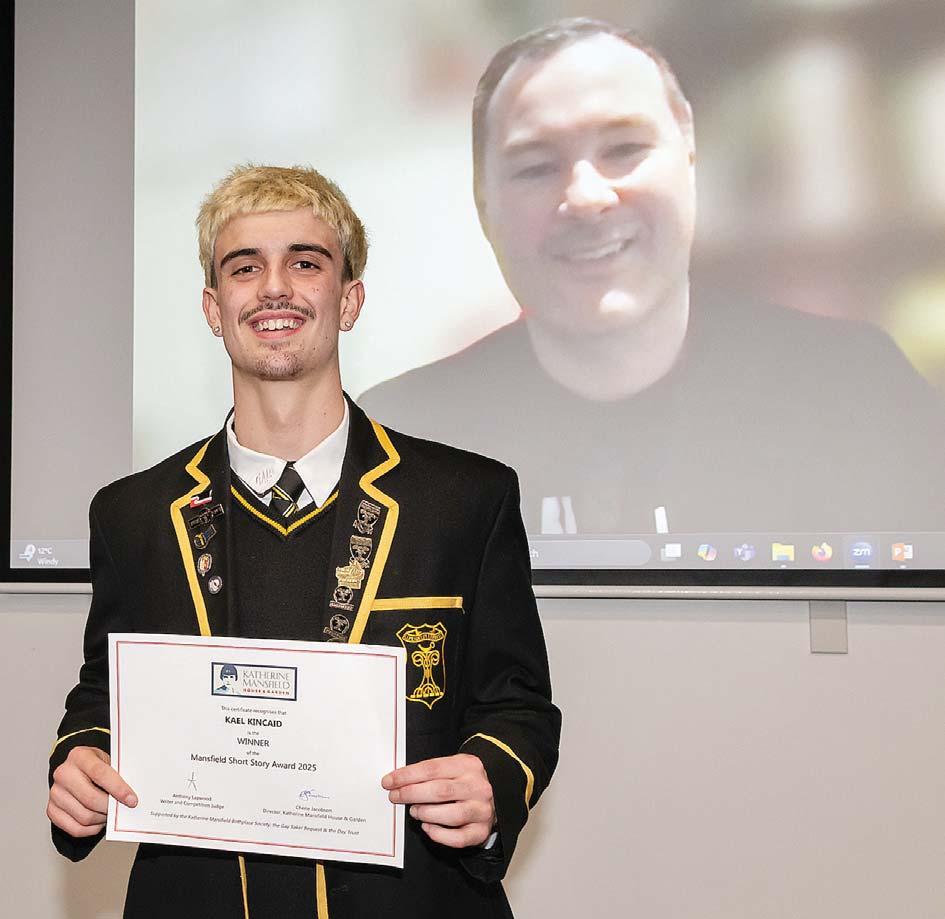




By Frank Neill


Khandallah resident Kael Kincaid is the winner of the 2025 Mansfield Short Story Award. The Wellington College student’s story ‘The Boy Who Wouldn’t Bow’ was described by judge Anthony Lapwood as a “commanding and clear-eyed story [that] follows college student Te Ariki as he fights to maintain his mana in a colonial schooling system.”
Continued on page 2.
Kael Kincaid with his short story award, just after he was named the winner by judge Anthony Lapwood, who joined the presentation via Zoom and is on the screen behind Kael.
Supplied.













Phone (04) 587 1660 www.independentherald.co.nz




REPORTER
Frank Neill herald@wsn.co.nz
027 490 3916
NATIONAL SALES
Les Whiteside les@wsn.co.nz
021 360 008
SALES
Steve Maggs steve@wsn.co.nz
027 765 8303
SALES
Brenda Ingram-Johnson brenda@wsn.co.nz
021 640 152

CLASSIFIED SALES classifieds@wsn.co.nz

Continued from page 1.
Anthony commended the Year 13 student’s skilful control of language and dramatic tension.
“Grounded in a strong sense of identity and an energetic voice, the story pits the risk of punishment against the chance for progress,”
Anthony says.
“I am honoured and grateful to have been selected for this awesome award,” Kael says.
He adds that he wants “to pass on my gratitude and appreciation to Anthony Lapwood for sharing his insights into my writing.”
Kael was named the winner at an event held for finalists at the National Library of New Zealand on Tuesday 9 September.
The annual competition is open to Year 12 and 13 students in the Wellington region.
From around 140 entries – setting a new record for entry numbers – a shortlist of 12 finalists was selected and these were judged by Anthony Lapwood, an award-winning Wellington writer.
Anthony was unwell on the night so beamed into the event from his home via Zoom.
Anthony told the students that to be shortlisted from a record number of entries was a huge deal.
“It’s a recognition not only of your skill, but of having a voice that stands out.
“Your superpower as writers is to help others see the world, and themselves, in a new light.
“The proof of this superpower is clear in the pieces I read – rich
in feeling and insight, and wideranging in style and subject.”
The runner up was Emily Liu, Year 13 at Samuel Marsden Collegiate School, with ‘Remembrance’ which charts the rise of technology from present-day tools of convenience to near-future autonomous devices of coercion and compliance.
“While the story has terrific fun cataloguing its dystopic tech – in delightfully inventive and precise turns of phrase – like the best science fiction, its focus remains on the human questions, including technology’s slow erasure of longheld ideals about freedom, truth, connection and contentment,” Anthony says.
The award is run by Katherine Mansfield House & Garden, the birthplace of internationally acclaimed modernist writer Katherine Mansfield.
It is supported by a bequest from longtime Wellington English teacher Gay Saker, whose daughter Nicola was at the awards.
The Director of Katherine Mansfield House & Garden, Cherie Jacobson, says this year a record number of entries was received.
“The quality was also really high,” Cherie says.
“It’s exciting that so many students are expressing themselves through writing, especially at a time when there are concerns about literacy levels and how technology is impacting creativity.”
As well as celebrating the life and work of Mansfield, Katherine Mansfield House & Garden pro-
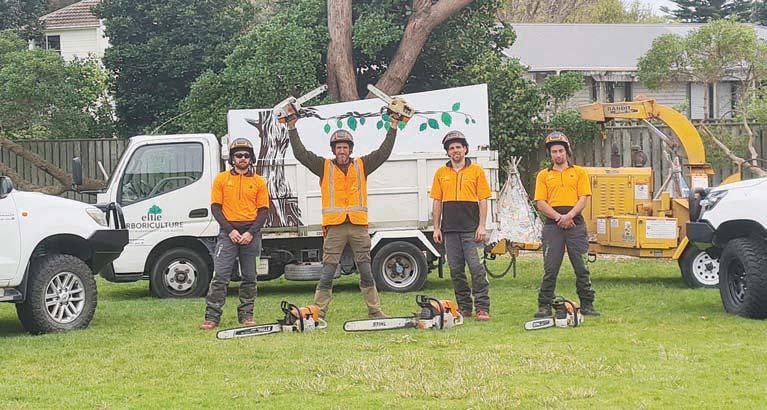
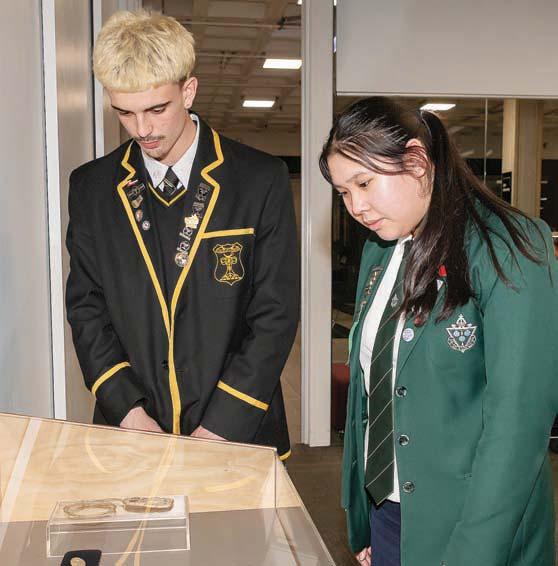
motes reading and writing through initiatives such as the annual short story award and school holiday creative writing workshops.
“We love seeing the next generation of writers through these initiatives,” Cherie says.
“Mansfield herself had stories published from a young age, so giving young people an opportunity to develop their skills and get recognition for their work is a great way to honour Mansfield’s legacy.”
Guests at the event were able to view some of Mansfield’s personal
belongings on display from the Katherine Mansfield House & Garden collection.
“Seeing objects that Mansfield used – like a postcard she sent home to Wellington from London and treasured volume of Milton’s poetry – helps to make her a real and relatable figure,” Cherie says. The stories of all 12 finalists have been published on the Katherine Mansfield House & Garden website, the winner will also be published on the Verb Wellington website.




ChoctoberFest kicks off on 20 September, making Porirua the most delicious destination for the spring school holidays. During this four-week long annual celebration of Whittaker’s chocolate, 32 Porirua cafés will be serving 28 unique chocolate drinks, vying for the title of Top of the Chocs, and you have until 5 October to try 18 delicious baked treats in the Whittaker’s Bake Off.
With hot and cold drinks, decadent baked creations, vegan and gluten free options, and even cocktails packed full
of Whittaker’s chocolate, even the biggest chocoholics will be satisfied!
Once you’ve tasted, vote for your favourites, then see who comes out on top. You can also win great prizes including a Whittaker’s factory tour, invites to an exclusive Whittaker’s x Peppermill Café event and café vouchers. To celebrate the 75th anniversary of the Whittaker’s Peanut Slab, someone will take home 100 of these Kiwi classics. All the details are at poriruacity.govt.nz/ choctoberfest

By Frank Neill
Northern suburbs residents are registering to be part of a class action compensation claim relating to the change in flight paths introduced in December 2022. This follows a meeting organised by Plane Sense Wellington that packed the Johnsonville Community Centre on 14 September.
More than 100 people packed the community centre to hear an outline of the Plane Sense evidence prepared for Judicial Review, due to be heard in the High Court from 17 to 19 November.
Plane Sense’s Judicial Review proceedings against Airways, Aeropath Ltd, Wellington International Airport Ltd and the Director of Civil Aviation is asking the High Court to declare the flight path planes are currently taking to be declared invalid and to be set aside.
The evidence Plane Sense is presenting to the Court was outlined by Broadmeadows resident and lawyer Kim Murray, who is representing Plane Sense in the judicial review, supported by law firm Dalzell Wollerman.
Dalzell Wollerman, who are class action lawyers, also outlined the potential class action compensation claim at the meeting, and this was followed by people registering for the class action.
People interested in also registering for the class action can register their interest at www. planesensewellington.com/contact.
“The packed Johnsonville meeting highlighted the depth of community concern about the DMAPS jet departure path,” Plane Sense says in a media release.
“Residents were updated on



evidence already before the High Court – evidence pointing to serious safety, health and economic risks for thousands of people living beneath the flight path.”
The community meeting drew a “large and vocal crowd,” Plane Sense says.
“Residents expressed outrage at the flight paths and the fact there was no community consultation before they were implemented.”
Introduced in December 2022 without public consultation, DMAPS directs jet aircraft departures away from the harbour space and over densely populated, high-altitude suburbs, sending aircraft towards Mount Kaukau.
The 14 September meeting was told that independent experts warn the changes increase complexity, pilot and controller workload, reduce separation between aircraft, and expose residents to noise levels known to harm health, learning and wellbeing.
Official Information Act (OIA) documents show the Civil Aviation Authority (CAA) raised concerns about DMAPS well before its implementation by Airways and approval by Wellington Airport.
From 2018 onwards, CAA staff questioned the risks posed by Wellington’s terrain and the proposal to reduce separation.
By June 2022, specialists warned the process felt “reactive and rushed” and that the 1.5NM separation did not comply with international safety standards, the meeting was told.
DMAPS went live on 1 December 2022. Within days, three safety incidents were reported.
Subsequent OIA discoveries reveal that safety concerns were being withheld from the public even as incidents continued.
Yet Airways and Wellington


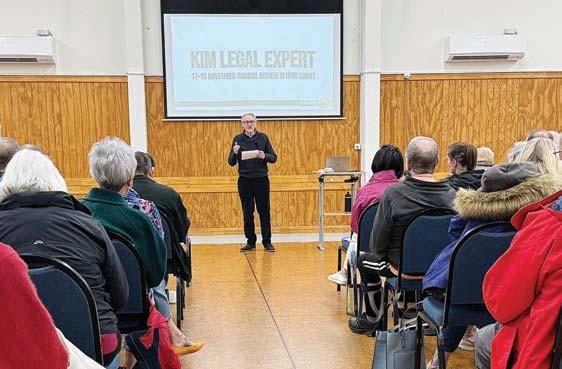
Airport continued to promote DMAPS as a “safety improvement,” including in person to affected residents at Plane Sense’s first community meeting in June 2023.
When Wellington Airport finally undertook community consultation in 2024, the CAA’s safety concerns were not disclosed, and Airways’ submission again omitted the risks.
Records obtained by Plane Sense under the OIA also show that one year after the commencement of DMAPS the CAA imposed conditions on Airways, preventing Airways from using the reduced separation distances between aircraft.
However Airways did not comply with the conditions.
Plane Sense informed the community meeting that it is aware from these disclosures of at least nine missed approach safety incidents.
Independent experts in aviation, air traffic control, acoustics, economics, and health have all submitted evidence in support of Plane Sense’s case.
Evidence before the Court and summarised with residents at the


community meeting include:
safety concerns that were never disclosed to the public or the Court but were discovered and submitted by Plane Sense;
of Environmental Epidemiology, drawing on international research, confirming that aircraft noise at the levels experienced by residents harms health, disrupts sleep and undermines children’s learning;
Day’s evidence in another case, acknowledging that comparable noise levels impact residential housing; and
ducted by leading Autralian consultancy Sapere Research Group, showing homes under the DMAPS path have lost up to $453 million in value.
“This is more than a noise complaint,” says Plane Sense Co-Founder, Roxy Steel.
“This is about fair process and access to justice.
“Families are paying fourfold — in their health and wellbeing, through their taxes which fund public organisations such as the



The Southern Cross Round the Bays event returns for 2026 and will be held on Sunday 15 February.
The event features three challenges
One is a 21km half marathon, one is the “iconic” 8.4km course and there is also a family-friendly 5.5km “shortcut”. Costumes are basically mandatory at the Round the Bays.
“Bring your best wind-themed look,” the event organisers say.
“This year’s theme, ELEMENTAL, brings fresh energy to the series and in Wellington, it’s all about wind.
“Let the breeze lift you along the iconic waterfront as you soak up the views, the buzz, and the unbeatable vibe of the capital in motion.
“Whether you’re chasing a PB, upping your fitness game or taking the whānau for an epic Sunday stroll, there’s a place for you on the start line.”
People can book for the event at raceroster.com/events/2026/108842/ southern-cross-round-the-bays-wellington.
CAA, in the lost value of their homes, and in legal fees fighting this case.”
“This case may set the tone for how changes affecting communities are handled,” says Plane Sense Co-Founder, Louisa Picker.
“On the surface, organisations like Airways and Wellington Airport promote corporate responsibility.
“In practice, they have pushed through a process that has sidelined communities and prioritised profit over people.
“Community interests must hold sway when decisions affect health, safety and amenity.
“Transparency and accountability are not optional.
“They are essential safeguards when the lives and wellbeing of communities are at stake.”
“This time it’s our community,” Roxy adds.
“Next time it could be yours.
“This case sets a precedent for how all communities are treated. Plane Sense is fighting for people over profit on behalf of all communities.”


























By Frank Neill
The Johnsonville Salvation Army held its 30th birthday celebrations on the weekend of 5, 6 and 7 September.
“It was absolutely packed,” says Major Mat Badger, the Johnsonville Corps Officer.
“People came from all over the country and we even had someone came back from Australia for it.
“We had close to 300 people.”

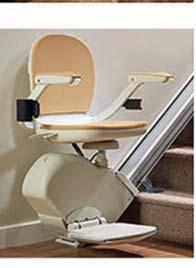




The Johnsonville Salvation Army held its first service on Father’s Day 1995, 7 September, holding its 30 year celebratory service 30 years to the day later on Father’s Day 2025.
With the 30 year anniversary coming up “we put the idea out there and people came on board with it.
“What we thought would be quite a small thing suddenly became a huge thing,” Major Badger says.
The weekend of celebration began with a reunion evening on the Friday, where the Salvation Army created a space where people could come and reconnect.
Historical displays were also set up, film footage going back 25 years was screened and the founding officers gave a presentation on how the Salvation Army started in Johnsonville.
The Saturday morning began with a men’s breakfast.
The keynote speaker was Brad Adamson, who has been a Salvation Army soldier in Johnsonville for a long time.
A Police officer, Brad has also been a member of the Prime Minister’s protection squad. He talked about walking in the worlds of

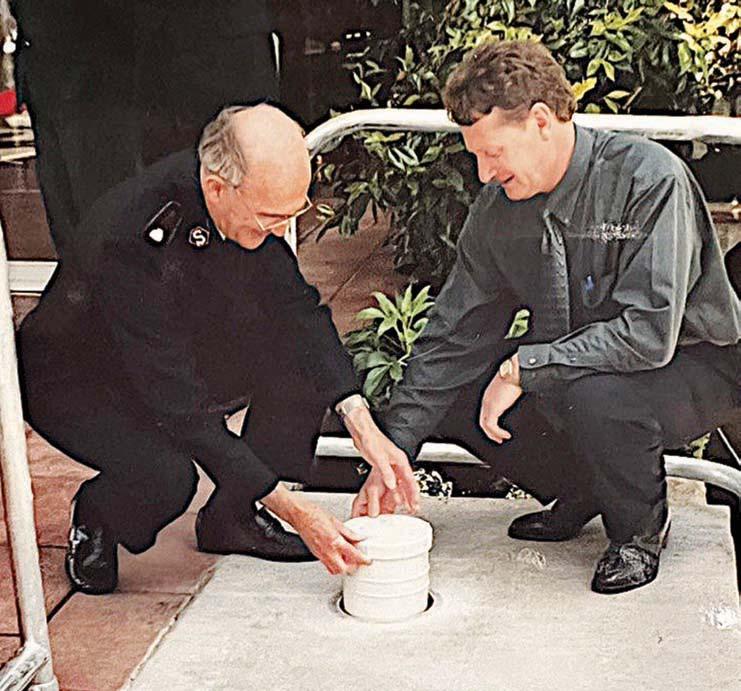
protecting the Prime Minister during the week and being involved with the Salvation Army – sharing what it is like to have a foot in both camps.
A youth event followed and during that time the young people created around 30 cakes, which were then auctioned on the Sunday, raising more than $800 for the Johnsonville Salvation Army foodbank.
Saturday evening saw an entertainment and quiz evening, where all the questions related to the history of Johnsonville and the Salvation Army involvement in the suburb.
The entertainment also included a rerun of the Rugby match between the All Blacks and South Africa.
The Sunday morning celebration service was “absolutely packed,” Major Badger says.
The celebration weekend ended with the lifting of a time capsule which was put in the ground on 18 November 2000 when the Salvation Army’s building was opened.
Liam Kendrew found a 25-year-old copy of the “Independent Herald” in the capsule.
Liam’s grandfather, Commissioner Ross
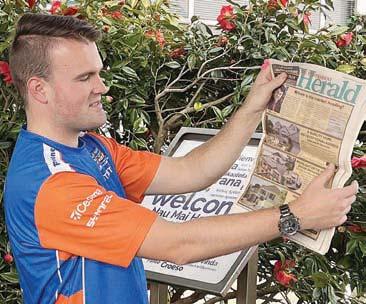
Kendrew, who has since passed away, was one of the people who placed the time capsule in the ground. That “is quite a significant thing because Liam’s grandmother still attends,” Major Badger says.


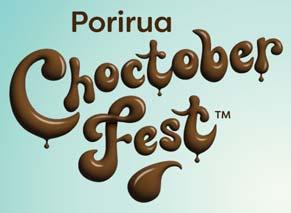



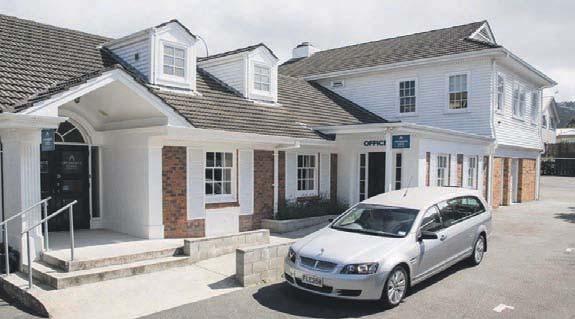


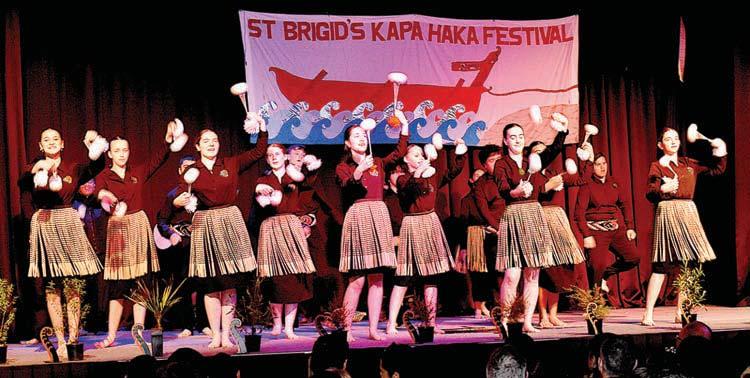
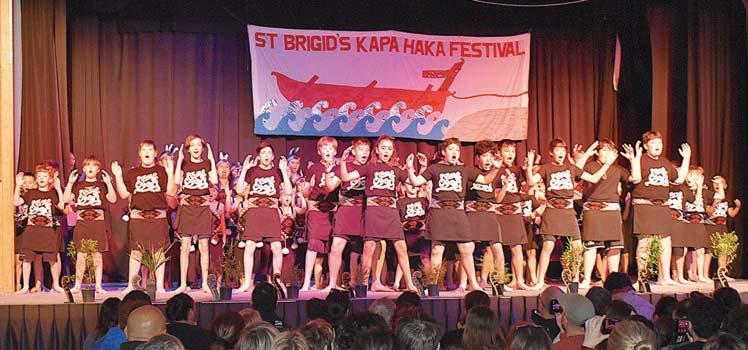
By Frank Neill
Thousands of people descended on Newlands College on Saturday 13 September for the 2025 St Brigid’s Kapa Haka Festival.
The college hall was packed for the performances by 15 schools, 14 of them from Wellington’s northern suburbs as well as Wilton’s Te Kura o tari.
The year’s festival was jointly organised by Johnsonville School, Te Kura o tari and West Park School. Schools take turns to organise the festival.
All three schools performed at the festival, along with Cashmere Avenue, Khandallah, Crofton Downs, Churton Park, St Benedict’s, St Brigid’s and Amesbury Schools, Newlands and Raroa Intermediate Schools, Onslow College, Te K hanga Reo o Ngaio
and Te Kura o Ngaio.
The festival, which was attended by around 3,000 people, is not a competition.
It is an opportunity for rangatahi in the northern suburbs to display their talents.
The day began with a powhiri at 8:30am.
Matu Wayne Firmin founded the St Brigid’s Kapa Haka Festival in 2001.
“My idea was to get all the schools in the northern suburbs together,” Wayne told the “Independent Herald”.
To achieve this he initiated the festival.
“It started with five or six schools and has now grown [to 15 schools],” Wayne said.
Each year the name of the host school is engraved on a Mauri, which was hand carved by Eugene Ryder, the well known social worker, who campaigns against violence.
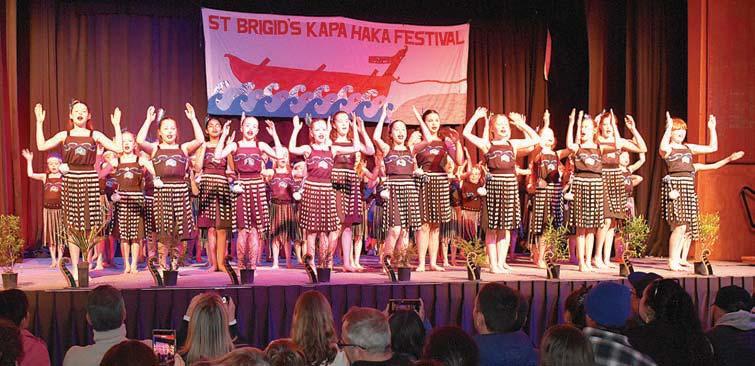

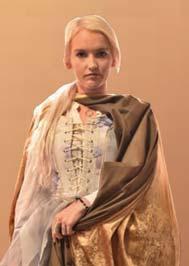


















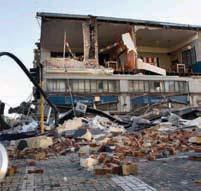


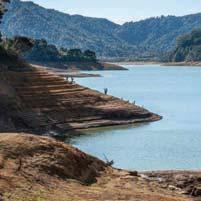

By Frank Neill
A group of Christian clergy chained themselves to the Johnsonville office of National MP Nicola Willis this week.
With the protest, they are asking for the government to impose sanctions on Israel for its actions in Gaza.
Six Anglican and Catholic clergy and archdeacons chained themselves to Nicola Willis’s office at 10am on Monday 15 September.
They held signs saying “Love demands action” and “Sanctions speak louder than words”, and asked for Nicola Willis to meet with them.
As well as chaining themselves up, they also began fasting at 10am on Monday and continued going without food until 10am the next day, breaking their fast with Eucharist, where they ate bread and drank wine that symbolises the body and blood of Jesus being broken and shed for all people.
They invited Nicola Willis to join them for the Eucharist and to eat with them, but she did not take up the invitation.
Around 50 people attended the Eucharist, however, including students from Bishop Viard School.
That, says protester Mel McKenzie – the Archdeacon of St Anne’s Anglican Church in Northland – was a “really special moment.
“They also sang for us ... and many of us were in tears.”
Green Party MPs did answer the invitation

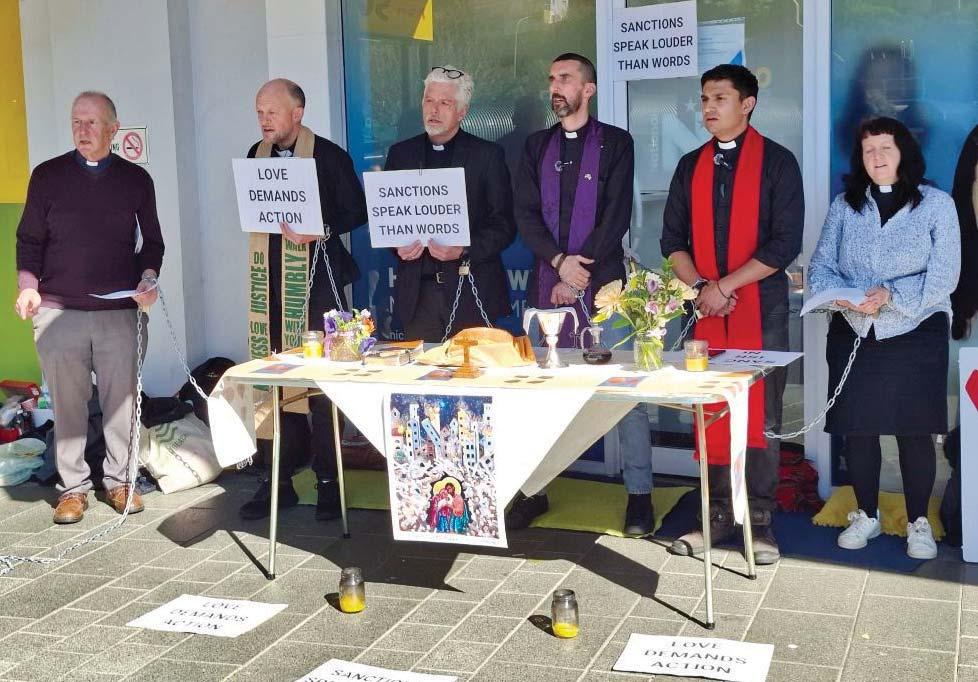
and attended the Eucharist also.
“There was a really incredible sense of community support and connection” at the Eucharist, Mel says.
“It was quite a holy moment of just us sharing our hopes for a ceasefire and to turn from that level of destruction.”



Governments are not heeding and listening to what many people around the world are saying. They need to listen and need to introduce sanctions.
The six protesters unchained themselves from Nicola Willis’s office 32 hours after their protest began, doing it at 6pm on Tuesday 16 September.
The protest at Nicola Willis’s office received great support from the local community.
“People were showing up endlessly with food,” Mel says.











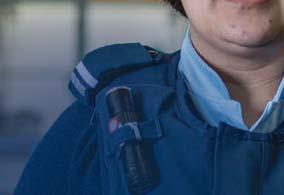


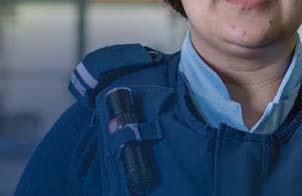



The MP had still not met with the protesters.
The aim of the protest, Mel says, was “to try and get a time frame for the government to impose extensive sanctions on the Israeli government.
“People are deeply concerned at the level of suffering, particularly women and children and the elderly, for the people of Gaza and the West Bank.
“Hundreds of people have shown up with items – food and blankets and many, many hot water bottles when it got cold.”
The protest began with six people: Mel, Rev Paul Fletcher, the Vicar of Newtown; Archdeacon Martin Robinson; Rev Andy Hickman, the Vicar of Onslow; Father Gerard Burns, Priest of the Catholic Parish of hariu and Rev Christopher Kirby from Whanganui.
The Johnsonville protest was one of two that took place in New Zealand this week.




















“Sanctions speak a lot louder than words,” Mel says.
The level of human catastrophe in Gaza
“is really beyond any conditions we can imagine.
“Many people are quite visibly moved by the level of the humanitarian crisis.”

A group of Anglican, Baptist and Catholic clergy held a sit-in at Health Minister Simeon Brown’s office in Pakuranga on Monday but were trespassed and moved out of the building.






















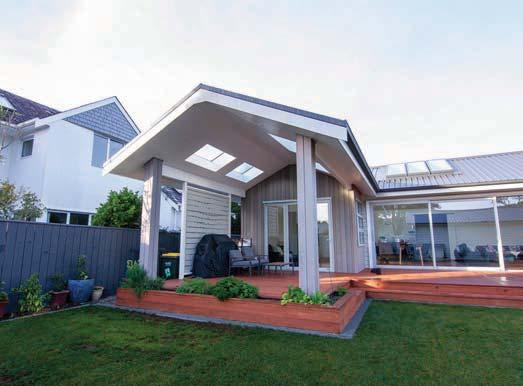
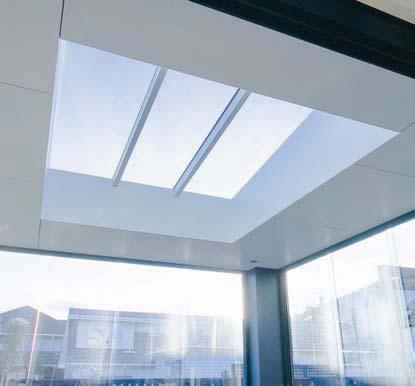
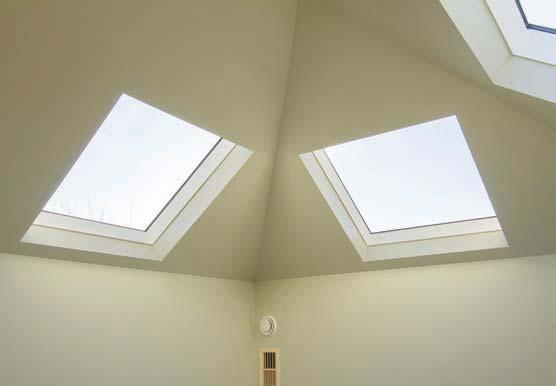


Skylight Specialists have been specialising in skylights for 25+ years. We have yet to come across a brand/make/type or configuration of skylight that we do not know everything about.
Skylight Specialists is LBP (Government approved licensed building and roofing practitioners) , with 30+ years in the building industry and employ a highly skilled team which consists of trade qualified glaziers, roofers and builders.
When we come and assess your skylight/s we will provide you with a free, no
obligation quotation. We will also provide you with a detailed report including photos that will include our findings and recommendations whether it be for general maintenance, repairs or replacement.
At this time of year everyone is concerned about insulation of their homes, trying to keep warm and retain heat. Unfortunately, skylights are often overlooked, even when they can be sometimes the main factor of heat loss. Older skylights are sometimes full-time venting without the homeowner even being aware of this, which is no


different from leaving a window open 24/7. Others are only single glazed or just plastic. By upgrading to double glazing you can retain up to 70% more of your heat. A lot of skylights we come across is simply a piece of glass glued to the roof structure of your home – This is by far inadequate for many reasons including thermal properties and condensation issues, as the moisture has no where to go but get absorbed by the structure of your home. We will assess the entire skylight including the flashings (roof flashings
are what connects the skylight to your roof and keeps all watertight). This will cover if you have adequate condensation channels, drainage, seals, condition of flashings, thermal properties and of course longevity of the skylight/s and the surrounding areas.
So if you’d like to add A LOT more light into your home and want the job done well, contact them on 0800 85 86 87, 04 938 0721 or 027 595 4448.
“We are tradespeople not sales people”



























































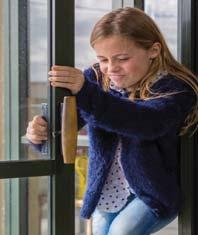
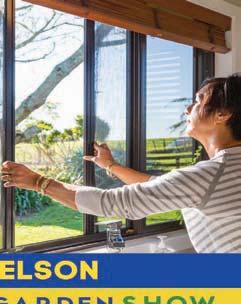
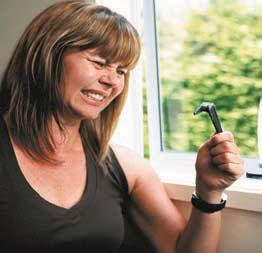










Reverend Lance Lukin from the Mission to Seafarers was the guest speaker at the August meeting of the REBUS Club of Khandallah.
Lance is the Regional Director and Port Chaplain for the Port of Wellington.
The Mission to Seafarers was founded in the United Kingdom in 1836 by the Reverend John Ashley.
Lance spoke of his work as part of the oldest charity in Wellington, as it started in Wellington in 1898 and the first centre was opened in 1903.
Ships were unloaded by hand and a ship could be in Wellington for two to three weeks.
Today a ship will be alongside for less than eight hours, making it tough for crews to come ashore and get any sort of break.
The seafarers crewing ships that bring New Zealand imports earn wages far below the wages of New Zealand seafarers.
The Mission to Seafarers is responsible for Oceania, and has teams which visit the ships entering their ports.
Oceania covers Polynesia, Melanesia and Micronesia – around 100 million square kilometres of ocean.
They provide WIFI when ships are in port, contactless shopping, mental health support, justice and advocacy, and pastoral care.
They also visit smaller ships, which can be crewed by children without shoes or suitable clothes.
One ship arrived in Suva after being at sea for 538 days. It had interacted with 19 other vessels, bunker ships delivering fuel and supplies, and fish processing ships to remove the catch.
Every day human rights abuses occur at sea and life at sea is tough. Some seafarers have minimal basic food and use makeshift beds.
REBUS is a social club for retirees, and usually meets on the last Friday of the month.
The next REBUS meeting will be on Friday 26 September at 10am at the Khandallah Bowling Club, Woodmancote Road.
The Speaker will be Bee Dawson, speaking on 'God, Guns and Gardens' – how the first missionaries developed the first European gardens in the Bay of Islands.
Visitors are welcome. For more information internet search “Khandallah REBUS”.
Missed an issue of Independent Herald?
Just scan the QR code with your phone’s camera to dive in.
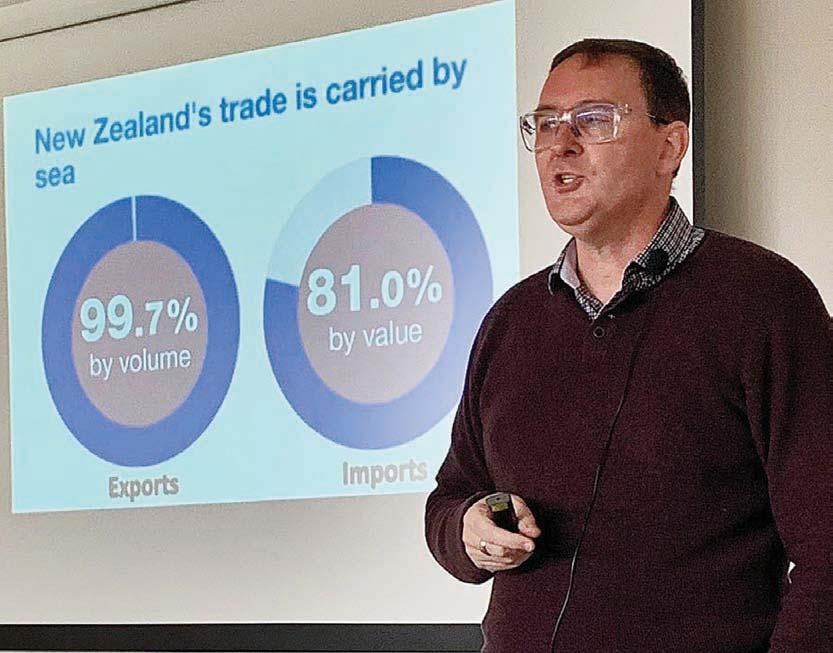

your
Bring the Herald to your fingertips - follow us on Facebook for real stories, real people, and the wins that make our town proud. This isn’t just a feed - it’s your front-row pass to community life.

Just by hitting icon and following The Independent Herald, you're in the draw to WIN awesome prizes!
Getupdatesthatmatter,supportlocal,andbepartofthe heartbeat of our community.
Don’t miss out - SUBSCRIBE NOW
(Winners will geta facebook message from the offical Independent Herald facebook)




Karori siblings Jayathi and Jayath Jaiganesh are making waves internationally with the release of their debut book, “Bella and Bio Bot”.
The book is now available online and in person in London, Cambridge, Sharjah and New York and has also been added to the prestigious British Library.
“Bella and Bio Bot”takes readers on an imaginative journey full of curiosity, adventure and discovery, showcasing the creativity and insight of these talented young Wellington authors.
The launch marks an exciting milestone
in their literary journey, and the siblings credit their parents, teachers, mentors and friends for their invaluable support and encouragement.
Jayathi and Jayath hope their story will inspire children and young readers in New Zealand and around the world to explore the joy of reading and embrace creativity.
People can order a copy of the book by visitingAmazon and searching for “Bella and Bio Bot Jayathi Jaiganesh” or using the direct link https://www.amazon.com/BellaBio-Bot-Jayathi-Jaiganesh/dp/1035862255.


Locals regard the Innkeeper as an ambient and friendly pub setting, where the staff are eager to learn your name, and prepare your favourite drink from their extensive range!
With spring being a little chilly, now is
hearty meals of the Innkeeper!
The restaurant features hand-cut steaks, roast beef, pork belly, mouth-watering burgers, the best fried chicken, and plenty of kids’ meal options.
They specialise in catering for large groups, fundraisers, and birthday parties.
This weekend why not join the atmosphere of the Johnsonville Club and Vista Cafe?
If you haven’t been to the Johnsonville Club before it’s in the heart of Johnsonville at 1 Norman Lane, across the road from Subway and up the driveway which gives us beautiful views over Johnsonville.
We have parking but are also close enough to taxis, buses, and the train for a worry-free way home.
Vista Café & Bistro aims for affordable,
family friendly, delicious meals with a range of dining to suit everyone.
chicken, and more.
our popular eggs benedict!
(*excludes steak).
the perfect way to end your weekend. members!
trusted and well-known Wellington
They have also relocated to large new premises in Alicetown, Lower Hutt.
glazing and you’ll find just the advice and look you’re after at their new Lower Hutt.
Their windows are ideal for helping keep your house warmer in winter and cooler in summer.
properties with double-glazing means their windows achieve thermal insulation levels that far exceed even
doors also offer these same thermal benefits.




from Aluplast in Germany.
As the city has awoken to the benefits company has grown. They have a number of teams of installers with
a thermal conductor and by combining it with double glazing, windows can achieve first-rate insulation values.
rubber gasket engaged by a multipoint locking system, windows and doors seal tightly and evenly against their frames, unlike legacy products like timber and aluminium joinery.
Contact them today to organise your next outing!
spirits at a bar leaner or on the couch by They are Johnsonville’s favourite local,
Get ready to dress for success at the School Ball or those special parties and events!
At Attire for Hire Judy Liddell is an expert in having you look great for your the women or suits for the men.
She has a vast array of glamorous dresses -
ing some from the United States.
At Sewing Alterations (part of the Attire for Hire premises in Johnsonville) Judy can see to your rips, adjustments, darning, lining or whatever might be holding you back from wearing that special item. Judy is Wellington’s answer to TV’s “Repair Shop” programme!
Open 7 days 11-13 Broderick Rd, Johnsonville Ph: 04 478 9753




Let us dress you for your next event! School Formal Wedding Work function Awards ceremony Party






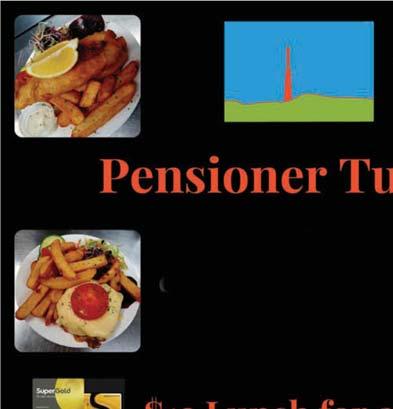

Sunday Roast: Served 5:00pm–7:00pm the perfect way to end your weekend



Recently I wrote about having gardens like our grandparents had... If they were like most people back in their days, they were keen gardeners not only for pleasure but for necessity.
There were times that they went through which were tough, depressions, out of work, struggling to make ends meet, so they buckled in and made the most of what they had.
Growing their own vegetables and fruit, preserving and bottling surplus and spending what money they had wisely.
Eighty to a 100 years later we are in the same boat these days with countries like France, UK, Germany and USA and many more
Here in NZ also Govt is broke and our young people leaving in their hundreds to Australia and other countries.
increasing for home owners and exorbitant rents for those without their own home not a good time.
Thus we ideally need the wisdom of our grandparents to keep our expenses down and grow as much healthy food as able.
Not only is this a big saving on family it means also very big savings on health bills as the food you can grow naturally and cheaply will keep money in your wallet and you
Our grandparents only spent minimal money to grow vegetables as they used the materials that were and are available.
Animal manures including chicken manure went into the gardens to feed the soil life and the plants

growing there.
If you are fortunate like myself to have chickens which I am able to muck out their hen house and put that into my gardens.
If not there are ways and means...
Start by reaching out to local farms and stables.
Many livestock owners have excess manure and are happy to give it away.
They usually pile manure mixed with bedding materials like straw and hay, allowing it to decompose and become more valuable for gardening.
Ask on your local Internet Neigh-
farmers near you happy to help.
Trade Me has listings in some areas and there maybe one close to you.
There is Zoo Doo for some people in some areas more handy to likes on Wellington zoo with home deliveries.
But your best source are farms in your surrounding rural areas.
What to do with the poo? The best way is to have a good size plastic rubbish tin with a lid, place about a third full of manure in the container and then two thirds full with non chlorinated water.
Make a paddle so you can stir it ever day or two making it into liquid manure.
Often from all animal manure except chicken manure, there can be weed seeds and as a result of the stirring most of the seeds will them off with a kitchen sieve.
Now when you come to planting seedlings simply put about 250 mils of your freshly stirred liquid manure into the planting hole and


plant your plant.
Side dress existing plants by pouring some onto the soil in the root zone of plants.
Caution if you have a dog then keep him /her off the treated area of manure as I have found that many dogs think other animals manures are perfume for them and they will roll in it if able.
It is always best to lock your dogs indoors with curtains drawn so they cant see what you are doing in the garden and mimic your gardening when you are not around.
Now to increase the microbes in the soil use products that have live microbes in them which in my case we have Wallys Super Fish Fertiliser: this is manufactured by the
blended with humate, seaweed and biology including Bacillus subtilis, Trichoderma, mycorrhizae fungi etc, together with gibberellic acid which promotes growth.
Designed to provide a high quality, cost effective fertiliser.
Used at 30ml per litre of non chlorinated water as a soil drench, or 15ml per litre of non chlorinated water for foliage spray.
Biologically active soils have the ability to retain moisture and release nutrients ensuring greater production, faster rotation and more rapid recovery from stress.
To build a healthy biological soil we need products that can feed living organisms.
Increasing public awareness of the environmental impact of using chemical-based fertiliser has created a demand for a safe, natural and environmentally friendly fertiliser. Biological fertilisers increase nutrient availability and feed im-

By Wally Richards

portant soil organisms, such as earthworms and microorganisms (fungi and bacteria) – all essential for plant and soil health.
Soil health and soil fertility requires much more than NPK fertiliser.
Without the right biology, plants and animals cannot reach their full potential.
Biology is essential for the recyatmospheric nitrogen.
Wallys Super Fish Fertiliser is one of the most complex and complete biological fertilisers produced in New Zealand.
This is all designed to provide a high quality, cost effective biological fertiliser for use in your garden.
The one litre container it is great value making 33 litres of plant food for your gardens or 66 litres of foliage spray on food for plants.
One interesting thing also when sprayed every week or so over plants a lot of pest insects don’t like it and tend to have less disease and pest problems.
Plus if you take say 100 mils of

Wally Super Fish Fertiliser and put it into a bucket with about 2-3 litres of non chlorinated water and then add about two tablespoons of molasses dissolved in hot water, stir and leave in a warm place, the microbes will quickly reproduce and expand the mix till it would likely
If you also sat the bucket onto a heat pad and put a air stone and air pump into the solution the growth of the populations would be far quicker.
Now this super charged food can be watered over plants and gardens after adding it to equal part of non chlorinated water.
You will have Bacillus subtilis, Trichoderma, mycorrhizae fungi going into your gardens building up the soil and humus making for gardens like your Grand parents had.
Great to spray over your compost heap to speed up composting. Most important afterwards not to use chlorinated water into the gardens and kill the goodness you have created.



The Chelsea and Marsden’s club mission is to provide a quality day programme in safe and home-like surroundings for people with Alzheimer’s Disease and other health-related disorders, as well as offering support and guidance to their carers.
The Clubs are run by a Manager, and we use a mix of professional care-givers, and carefully selected volunteer assistants also, and is committed to providing a high ratio of care. This makes it possible for members to enjoy a wide and varied range of activities appropriate to their abilities and interests, and offers stimulating conversations and interactions for all the members and staff. Call the Manager, Angela, for further interest in either club on 027 349 9691.
Email: office@marsdenclub.org.nz
Email: office@chelseaclub.org.nz



Alzheimers disease is among the group of conditions known collectively as dementia and is the most common form of dementia.


Around two-thirds of people with dementia,currently around 47,000 people have Alzheimers disease. Although the medical and scientific communities are still learning about the causes of Alzheimers disease, there are typical changes seen in the brain – shrinkage and a build-up of abnormal proteins (plaques and tangles). Alzheimers is progressive, starting as forgetfulness and mild confusion, progressing to memory loss, disorientation and changes in personality and behaviour. The symptoms each person experiences depends on the parts of the brain that are affected.
The changes that follow the onset of
Alzheimers affect a person’s ability to perform everyday tasks and interfere with their everyday lives. The disease is progressive, which means that for most people the changes gradually spread through the brain and lead to the symptoms getting worse. What they can do, remember and understand may also change from day to day. There are ways people can reduce their risk of ending up with Alzheimers disease. One is to eat healthy foods. Another one is to keep active. Give up smoking, which has been linked to increased risk of dementia, limit alcohol to a maximum of two standard drinks and manage cholesterol levels. Do mental activites you enjoy, stay socially connected and avoid knocks to the head.


A DVD player and DVDs ready to be borrowed. Photo: Supplied.
Wellington City Libraries has another exciting programme of fun and free events and activities for tamariki, rangatahi and their wh nau.
“We invite you to join us for ‘As seen on the screen’, the spring school holiday programme that brings your favourite films, TV shows and games to life,” Wellington Libraries says.
“From library scavenger hunts to Minecraft-themed LEGO building, there's something for everyone.”
To fnd out what's on visit https://www.wcl. govt.nz/news/as-seen-on-the-screen-springschool-holidays-2025/.
Calling teen film makers
“Put your creativity to use over the holidays and enter the rangatahi short film competition,” Wellington Libraries says.
“Running from the 20 September to 5 October, if you are aged 13 to 18 or attending secondary school, this competition is for you. “There are heaps of cool prizes to be won, as well as a special after-hours film screening and award ceremony for all shortlisted film makers held on Friday 17 October.”
The judges to be announced soon.
Learn all about it at https://www.wcl.govt. nz/explore/by-audience/youth/whats-on/ rangatahi-short-film-competition/.
Free borrowing
DVDs and Blurays are free to borrow at Wellington’s libraries from 20 September to 5 October.
“Need inspiration?” Wellington Libraries asks.
“We have thousands of movies, documentaries, TV titles and an expansive children's DVD collection for you to borrow.
“From cult classics to film festival favourites, our collection covers a huge range of subjects and genres.
“Visit your local library, browse the shelves and choose your ideal holiday viewing.”
This free offer applies to loans and renewals made from 20 September to 5 Octoberat any library branch or online.
All usual age restrictions apply.
“No DVD player? No worries. Most of our branch libraries have portable DVD players available to borrow.”
Learn more at https://www.wcl.govt.nz/services/at-the-library/portable-dvd-players/.
Greater Wellington Regional Council has welcomed the recommendations of an independent review into the National Ticketing Solution (NTS) and is looking forward to the future rollout of the programme which will make paying for public transport easier for passengers in Wellington and across New Zealand.
The independent review found that the NTS programme had found it challenging to accommodate a range requirements into the national technical solution.
NZTA has used the review’s insights to design a more manageable incremental release plan going forward.
Greater Wellington Chair Daran Ponter says he welcomes the findings of the review, with public transport passengers in the region looking forward to the rollout across Canterbury and its arrival in Wellington.
“As a council, we acknowledge that the NTS is a complex programme.
“Replacing four different systems across

the country with a singular system that works for all passengers isn’t an easy task.
“However, we have made it clear to theMinister of Transport that as time marches on there are real pressures facing the Wellington Region,” Cr Ponter says.
Chair of Greater Wellington’s Transport Committee,Councillor Thomas Nash, says Greater Wellington is committed to working with NZTA to deliver the NTS for the Wellington Region and working towardsdelivering an integrated roll out plan for the Wellington region and the rest of New Zealand.
“In the meantime, Greater Wellington is actively exploring opportunities that will deliver improved functionality to our customers sooner.
“Passengers have been waiting for a long time to pay with credit and debit cards and we want to deliver as much as we can and we are working with NZTA and our current provider to make this happen,” Cr Nash says.



Certifified d P Pluummbbeer a annd
Plumbing. Drainlaying. Roofing and Spouting. Blocked drains. Burst pipes. Repairs and Leaks. Black Dux Qest pipe replacement. Maintenance. Kitchens. Bathrooms. Replacing hot water cylinders.



















The Community Noticeboard is for non-profit organisations. For $15.00 you can publish up to 25 words. No AGMS, sporting notices or special meetings. Community Notices must be pre-paid. phone (04) 587 1660 or email classifieds@wsn.co.nz
Don’t Chuck It. Fix It! Ngaio Repair Cafe is free, open Saturday 20 September,10am-1pm, Ngaio Union Church, corner Crofton Road and Kenya Street, Ngaio.
By Felicity Wong
Kelvin Nairn studied marine biology and in 1975, aged 28, he joined an expedition across the Pacific Ocean.
Questions were still being asked about how Pacific peoples had populated distant small islands over vast areas of ocean.
An early theory by archeologist Thor Heyerdahl was that light weight balsa boats had drifted off the coast of South America, carried by the currents.
The expedition Kelvin Nairn joined was led by fellow Ngaio resident Jim Siers, who was interested in testing an alternative theory that proved correct.
largely of fish and (imported) rice.
There was also pandanus palm fruit and breadfruit.
The canoe builders were highly skilled but the voyaging canoe was the biggest they had built in more than 200 years.
It was built using only traditional materials.
In the past driftwood was used as coconut trees for timber was unsuitable.
It could take a generation to gather the necessary timber.
The ocean going canoe was shaped using hand axes and bush knives, no power tools.
In the past they would have used sharp sea shells only.
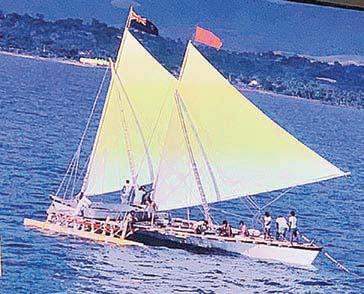



Is a coffee bean a fruit?
A coffee bean is a seed of the coffee plant, and is the source for coffee. It is the pit inside the red or purple fruit often referred to as a cherry. Even though they are seeds, they are referred to as ‘beans’ because of their resemblance to true beans.
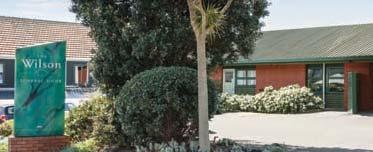

This was that Polynesian peoples were the greatest navigators and used natural materials to build ocean going canoes to carry out planned migrations in an entirely purposeful way.
So off Kelvin went to Tarawa, the largest atoll in Kiribati (pronounced “Kiribus”).
The atoll is less than 100km from the equator and only three to four metres above sea level.
Sea level rise from climate change is a serious concern.
The expeditioners lived with the locals of Taratai Village which had no electricity, sanitation or water other than brackish water from a well.
They slept in the large meeting house, cursed by mosquitos that transmitted dengue and yellow fever, as well as hepatitis.
Flies were always present because of the lack of sanitation and stomach upsets common.
There was a sadly high infant mortality rate.
Otherwise, Kelvin said it was a paradise where people who survived childhood were generally strong and resilient with good health.
Family canoes were the principal mode of transport and livelihood with a diet consisting
The canoe was bound together with “miles and miles” of coconut string made by women who pounded coconut fibre which had been soaked for months in sea water.
Then they rolled the fibre and added more fibre to make the strong coconut string.
While the boat builders up sized their design, it was not quite strong enough.
In hindsight Kelvin said they needed to have quadrupled their reinforcing (not merely doubling it).
Nonetheless the boat was finished with the shape of its hull helping the canoe to travel against the current.
Ten villagers and three Europeans set off for Fiji.
They had a sexton to check their position, stainless steel stays for the two traditional Shape sails, and a small bilge pump as nods to modernity.
Although they constantly used the bilge pump, they arrived safely after 45 days.
Fifteen days they had been sailing while the rest were on land as they hopped from island to island across 1500 nautical miles of ocean.
How was it possible to navigate?
The local people are surrounded by night sky stars.
sailed the pacific in. Photo: Supplied.
Their legends and stories entwined geneology with navigational information and seasonal references.
To know a particular star is directly above a village at a particular time of year means the village can be located again by reference to that star in relation to other stars.
The bright blue of an atoll’s lagoon is reflected in the underside of a cloud.
Birds return to land to roost at night, so the direction in which they fly at dusk shows the way.
If a rock is in a stream of water it creates patterns of waves around it.
Skilled navigators can read those swells and waves to identify nearby land.
Master navigators were held in high esteem.
Although the journey Kelvin took compressed into weeks what would have taken generations to complete, it showed navigation was possible in a canoe using traditional materials.
The voyage demonstrated that the design and construction of the canoe enabled it to sail long distances against the current and against the wind.










Instead of drifting from South America, Polynesian peoples were highly skilled sailors who developed star navigation, and natural building techniques for adventure, exploration and migration, from Asian origins.
In his recent talk to the Onslow Historical Society, Kelvin Nairn said that “Kiwis really started” the modern revival of ocean going canoe voyaging.
The canoe is now in Auckland’s maritime museum.
Wanderer (5)
Relish served with fish (7)
Sequence (5)
Unpredictable (7)
Distance measuring instrument (5-6)
Horse’s hindquarters (5)
Be in legal custody (5,6)
Stubbornness (8)
Mend (6)
Register (5)
Quiver (7)
Dark brown (8)
Concurs (6)
Ecclesiastical cap (7)
Governor (5)
Feast (7)
Marine alga (7)
Muslim name for God (5)
Intoxicating liquid (7)
Meat vendor (7)
Zero (3)
Bark (3)
(3-6)
Breed (9)
Last Week: 11 September 2025


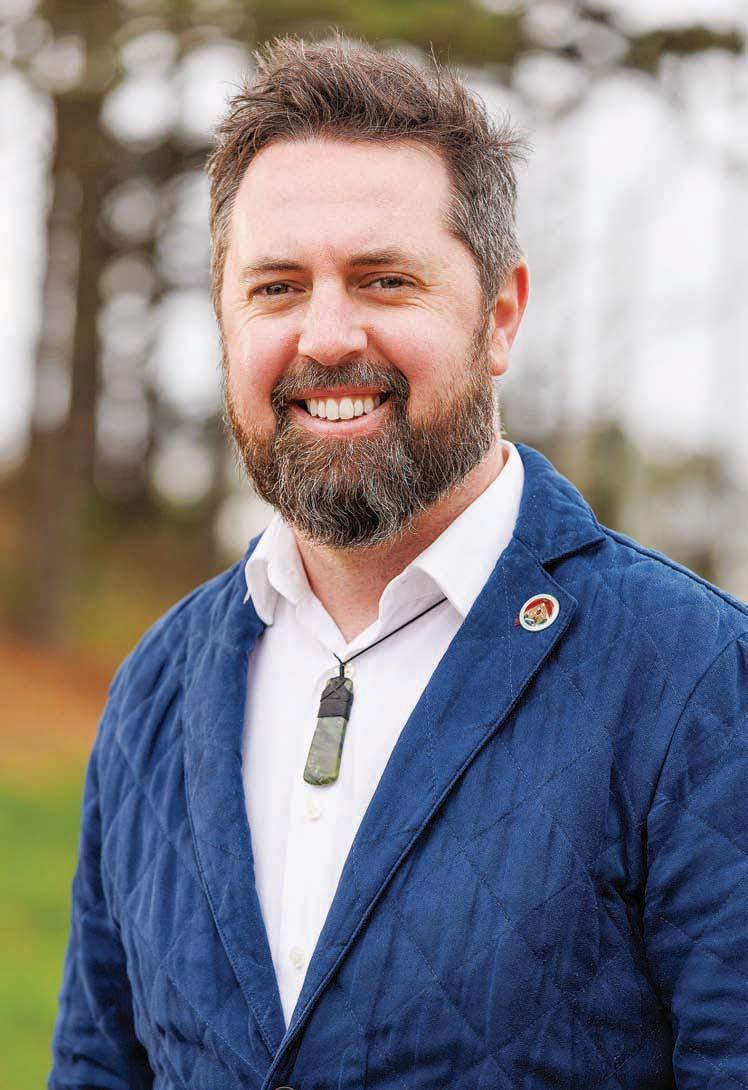
Onslow College will be getting 10 new teaching spaces and a modernised administration block, a move that has been welcomed by the college’s Tumuaki/Principal Jonathan Wyeth.
Education Minister Erica Stanford announced redevelopment funding for the school that will provide the new construction on 10 September.
The announcement “marks a pivotal moment for the school and its community,” Mr Wyeth says.
"We are thrilled to receive the confirmation of funding from the Minister.
"This investment is a significant milestone that will directly benefit every student at Onslow College.
“Our core focus is always on providing the best possible environment for teaching and learning, and this redevelopment is key to that vision," Mr Wyeth says.
"This project will allow us to provide our students and staff with the warm, dry and fit-for-purpose learning environments they deserve.
“Modern, flexible spaces are essential for supporting innovative educational practices and preparing our young people for the future.
“The redevelopment will address some of the school's most pressing property needs,



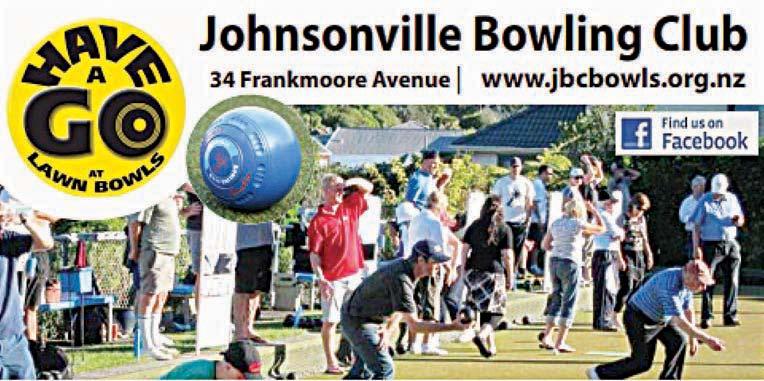
replacing classrooms and facilities that have served the community for decades but have been at the end of their functional life for the past 11 years.
“The new administration area will create a welcoming and supportive environment for our community to access Counsellors, Deans and other services.
“Following on from the value for money review which put the previous building projects on hold, the school has continued to meet every milestone and deadline in order to design spaces that will inspire learning and creativity for generations to come.
“Having been through four previous rounds of design the school is eager to begin the next phase,” Mr Wyeth says.
The provision of 10 new classrooms and a modernised administration block at Onslow College is part of a $300 million investment into repairing and upgrading 33 schools announced by Minister Stanford.
“For too long, these schools have been left waiting with no certainty about when their much-needed redevelopment would begin,” the Minister says.
“This investment is getting spades in the ground, addressing the backlog of unfunded condition-related projects that we inherited to ensure more children can learn in a safe, warm and dry environment.”
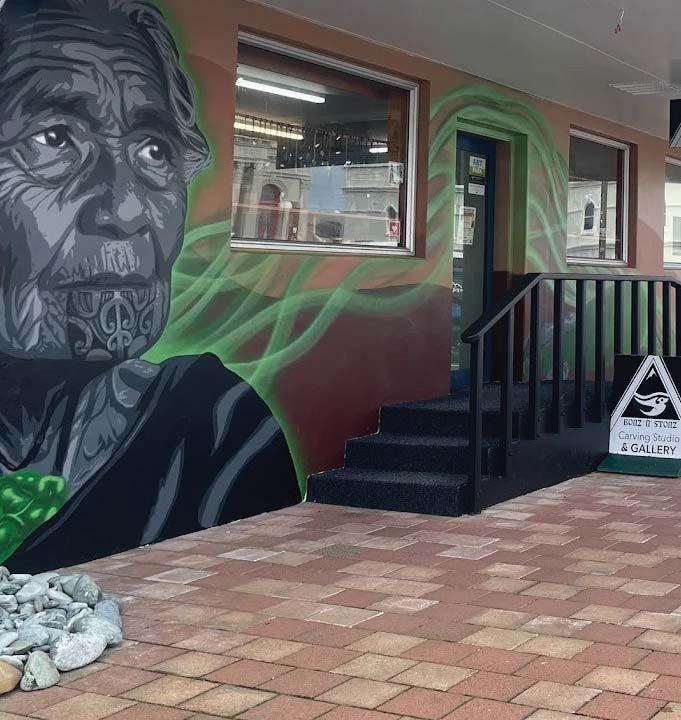
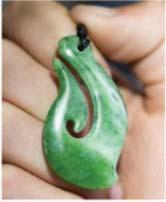
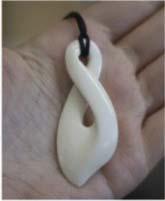
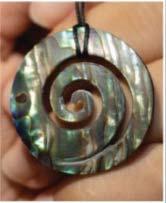




Find Us
Imperial Park, Unit 81, 41 Bouverie Street, Petone, Lower Hutt.
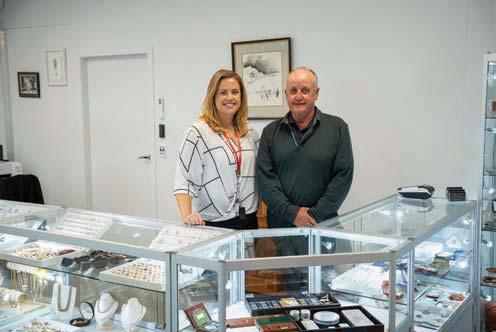
Please come and see us instore with your items for an on-the-spot appraisal and offer. If you are in any doubt, please bring the items in for us to look over.
Gold Jewellery
All Worn or Broken, Modern or Antique/ Estate Jewellery
Gold and Silver coins and bars
Any type and size.
Hours
Mon - Fri: 9:30am - 2:30pm Thursday: 9:30am - 6pm
Open Occasional Saturdays check at www.heritagegold.nz
Antique & Estate Jewellery



All Coins and Banknotes


All packaged coins and sets, silver and world coins and banknotes.
NZ’s Most Exquisite Range in Gold and Silver. We have Rings, Chains, Pendants, Brooches, and more! sets, silver an s. e the items r ba P ars

Bullion Coins and Bars
Watches


Enter Imperial Park, turn right, go straight on to the end, and you ’ll see us. to suit a ran of d Watches

Gold and Silver coins and bars. Investment grade, Verified and Certified, and in a range of sizes to suit a range of budgets.




Any Condition. Omega, Rolex, Tudor, Longines, and other watches.





We Specialise in Buying & Selling all kinds of Jewellery, Bullion, Coins and Banknotes, Silver and Gold items, and Watches. Fully licenced with over 50 years industry experience.
or

at www.heritagegold.nz